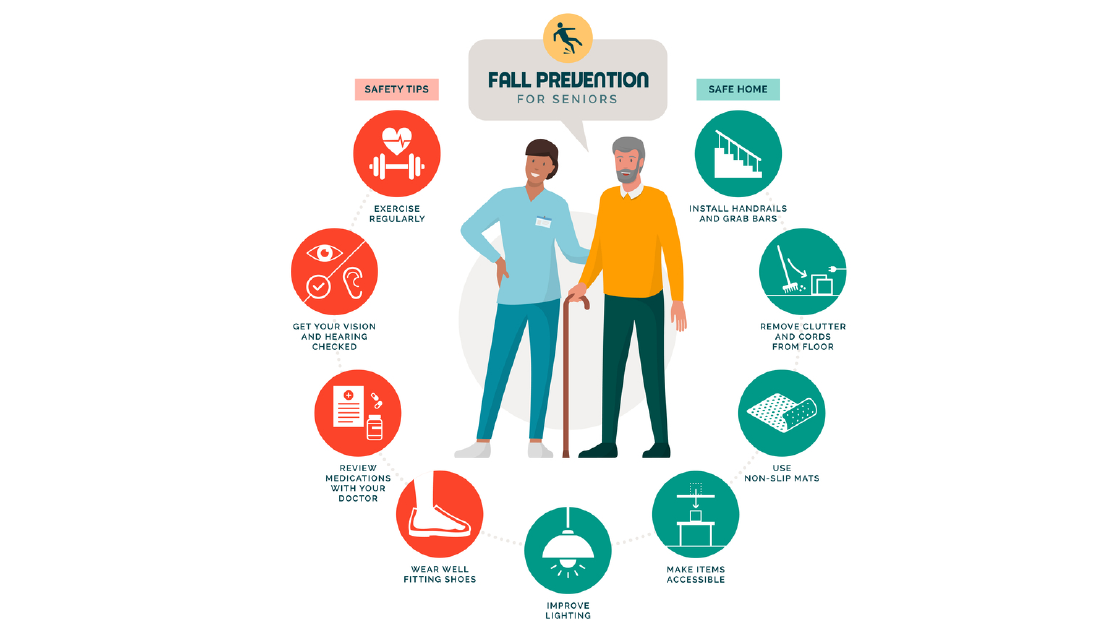Falls are common in seniors. According to the CDC, about 36 million falls are reported among older adults each year, with one out of every five leading to injury, such as broken bones or head injury, with some requiring admission to a hospital or even surgery to receive long-term care.
There are two reasons falls are common among seniors: 1) physical conditions, such as osteoporosis, arthritis, weak bones and muscles, difficulty in movement, such as balance problems, dizziness due to side effects of medications they may be taking, or vision problems, and 2) environmental reasons, such as not enough light in the home, lack of handrails in areas such as toilet and stairs, slippery floors, poor shoes or aids used in the home, or items obstructing the way, such as electrical cords.
Many seniors suffer from osteoporosis and fractures caused by falls. Additionally, if a senior takes blood pressure-lowering drugs and hits their head during a fall, cerebral hemorrhage, internal hemorrhage, stroke or even death can occur.
“Falls can have profound consequences,” says Annie Wu, a physical therapist with On Lok PACE. “Injuries can lead to a fear of falling again, which can lead to a loss of ability to self-care, change in mood, or even depression, restriction in movement or even disinterest in moving at all, resulting in reduction of bodily functions and a decline in mobility and muscle atrophy.”
There are several activities that seniors can do to help prevent falls. This includes building muscle and joint flexibility, taking your time when sitting or getting out of bed, and wearing shoes that fit snugly. “We also encourage seniors to have their vision and hearing checked regularly, making sure to get enough sleep, sitting down or getting up slowly to avoid dizziness, and making sure to be careful when walking on slipper or uneven surfaces,” added Wu. “Many people like to wear slippers, but they are not necessarily suitable. It is best to have shoes that cover the front and rear of the feet, for a safety reason.”
Seniors are also encouraged to pay attention to their home environment and make sure they are aware of items on their floors, use handrails where available, make sure stairs are free of obstructions, and avoiding reaching for hard-to-reach items to reduce the risk of falling. If a person does fall, they should notify their doctor. "Sometimes, if a person falls, they may not feel pain right away, but injury such as fracture could occur. Or in case of head injury, a more serious complication could occur,” Wu noted.
Understanding the cause of falls is important to prevent the next one. Exercise at home, with family members, and the use of assistive tools, such as walkers or crutches. Overall, stay active, participate in social activities, and stay positive.
“On Lok PACE’s physical therapists conduct safety checks every six months to ensure a participant’s physical functions have not changed significantly and create activity plans according to the interests and hobbies of the senior, to help them maintain their independence. As well as provide education, help them with exercise, and relieve arthritis, osteoporosis, and low back pain,” said Wu.
For more information about On Lok PACE, our full-service healthcare program, please call us at 1-855-973-1110, TTY: 711.
On Lok also offers weekly virtual fitness and fall prevention classes help seniors stay strong, healthy, and independent. On Lok Always Active incorporates movements that you can do on your own as well as in a group setting, with classes specifically designed for older adults and adults with disabilities. The 60-minute class is offered on Mondays and Thursdays 1:30-2:30pm PT. Classes in English, Spanish, and Cantonese are available. Contact us at 415-550-2210 to sign up for On Lok Always Active.
Source: World Journal, October 5, 2022
Link: https://www.worldjournal.com/wj/story/121370/6663415?from=wj_catelistnews (worldjournal.com)
